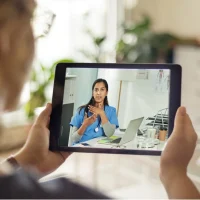There is no end to the number of applications available for smartphones, tablets and other digital devices. In recent years, wearable devices have also come onto the market, and are increasingly popular. These devices track personal health data, with the generalised goal of improving consumer behaviours related to health and wellbeing.
Emerging smart mobile health (mHealth) technologies can offer more than just motivational or reactionary behavioural change; if utilised effectively by care providers, a recent study shows that these tools have the potential to work proactively towards more preventative and cost-effective care. Investigators sought to answer the question “Is there any evidence that use of these devices and applications actually improve consumer’s health?
You might also like: Digital health has experienced a boom during the pandemic, with solutions such as AI and telemedicine being adopted with speed across Europe. However, as many instances of such adoption have been the result of temporary or emergency measures, there is a question mark over whether solutions will continue to be leveraged after the pandemic, or whether the boom will be short lived. Learn more
Researchers from New York University’s Stern School of Business partnered with a major mHealth firm that provides one of the largest mobile health app platforms in Asia specialising in diabetes care. They utilised detailed patient health data from activities (e.g., steps, exercises, sleep, food intake) and blood glucose values from more than 1000 chronic diabetes patients over 15 months.
Their findings showed that the adoption of the mHealth app led to an improvement in behaviours, which in turn led to both short term effects, such as a reduction in patients’ blood glucose) and longer-term metrics, such as fewer hospital visits and medical expenses. Authors report that patients who adopted the mHealth app undertook higher levels of exercise, consumed healthier food with lower calories, walked more steps and slept for longer periods on a daily basis. Study participants were also more likely to substitute offline visits with telehealth.
The study also compared results from the mobile and PC enabled versions of the same app, and predictably, they found that the mobile version has a stronger effect than PCs in helping patients make modifications to diet, exercise and lifestyle, leading to improvement in their health outcomes. Personalised mobile messages with patient-specific guidance surprisingly had little added value over non-personalised messages in patient app engagement and lifestyle changes.
This promising first-of-its-kind study demonstrates that emerging mHealth technologies can effectively persuade people to modify their lifestyles and thereby reduce hospital visits and medical expenses over time. Lead author of the study, Professor Anindya Ghose says “With this research, companies have an opportunity to better understand patients’ interaction with mHealth technology and design elements that will be most effective for patient adoption and engagement.”
“While our research focuses on the context of diabetes-care management, the methodologies and insights have the potential to be generalised to other chronic-disease and wellness-care contexts,” explains Prof Ghose. “By assisting patients with behaviour modification and disease self-management, mHealth platforms have tremendous potential for improving health outcomes and reducing medical costs.”
Source: NYU
Photo: iStock










